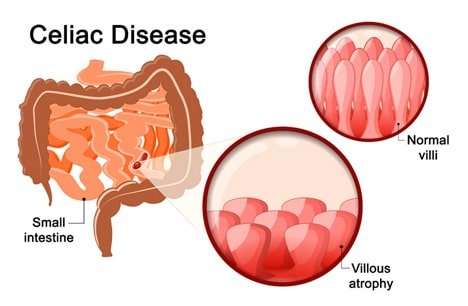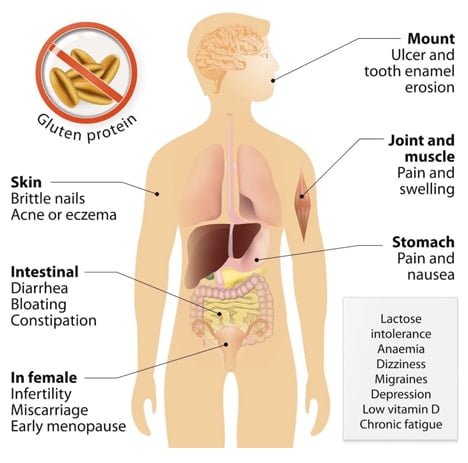What is Celiac Disease?
Celiac disease is an immune reaction to eating gluten, a protein found in wheat, barley, and rye that causes inflammation and damages the lining of your small intestine.
Celiac disease is a medical condition diagnosed by the NYC gastroenterologist that damages the lining of your small intestine. If you have celiac disease, eating gluten, a protein found in wheat, oats, rye, and barley, triggers an immune response that irritates your small intestine. Irritation leads to inflammation over time. As a result, certain nutrients cannot be absorbed by your body.
Celiac disease is very different and more serious than gluten intolerance. Gluten intolerance occurs when the body reacts adversely to gluten, causing symptoms but not damaging the intestines. This is an important distinction that your doctor should help you make with an accurate diagnosis.

Celiac disease can cause bloating, weight loss, and diarrhea. However, many conditions can cause this. It can lead to malnourishment of your brain, nervous system, skeleton, and vital organs. Many of those affected by the celiac disease don’t even know it. They often attribute the symptoms to other causes. Sometimes, their doctors don’t consider a celiac disease. Our doctors are top NYC GI doctors (gastroenterologists), and when weighing the evidence, they consider every possibility. If celiac disease is suspected, you should always be evaluated by a physician for an accurate diagnosis and treatment plan, as well as to rule out any serious illness or condition.
”
★ ★ ★ ★ ★My experience with Dr. Tsynman was fantastic. I didn’t have to wait long to see him, and he showed real concern. He’s very sweet. He asked all the necessary questions and then listened to what I had to say about all of my symptoms. For once, I feel like someone is finally paying attention to my lower GI issues, and, God willing, I’ll finally have some answers.
How common is Celiac Disease?
According to a new study by the University of Maryland Center for Celiac Research in Baltimore, nearly 1 out of every 133 Americans has Celiac Disease. The research indicates that Celiac Disease is twice as common as Crohn’s disease, ulcerative colitis, and cystic fibrosis combined.
Symptoms of Celiac Disease

Celiac disease affects people differently. Although the most common symptoms are unexplained weight loss and diarrhea, other symptoms can include:
- Abdominal pain
- Acid reflux and heartburn
- Anemia (from iron deficiency)
- Bloating and gas
- Constipation
- Cramps
- Fatigue
- Headaches
- Itchy skin rashes
- Joint pain
- Numbness in your extremities
- Pale stools
- Seizures
- Thinning bone density
- Tooth decay
Causes of Celiac Disease

No one, including gastroenterologists, knows what causes celiac disease. It may be partially genetic, but that doesn’t make a definitive case. When the disease is active, your immune system attacks the lining of your small intestine in response to gluten. This action damages the villi or hairs on the inside of your small intestine. They flatten or dissolve, making it harder, if not impossible, to absorb the nutrients from the food you eat.
Risk Factors for Celiac Disease
Celiac disease is an autoimmune condition that can affect both men and women of any age or race. There are certain genetic and environmental risk factors associated with a higher incidence, including:
- HLA-DQ2 and HLA-DQ8 Genes
- Family history of celiac disease
- Exposure to certain viruses
- Early-life exposure to skim milk
- Vitamin D drop exposure in infancy
- Higher gluten intake during the first five years of life
- Early-life exposure to antibiotics
One recent study found that people with Down syndrome are six times more likely to develop celiac disease at some point in their lives. Furthermore, if you have type 1 diabetes or thyroid disease, you are more likely to acquire this condition too. Those with Turner syndrome also carry an elevated risk of developing autoimmune disorders such as celiac disease.
Discover the article: Celiac Disease or Gluten Sensitivity?
Diagnosing Celiac Disease
Because the symptoms of celiac disease can resemble the symptoms of other conditions, like Crohn’s disease or irritable bowel syndrome, our doctors will give you a physical exam and ask questions about your medical history. They’ll likely order a blood test as well, especially if they suspect celiac disease. You may need other tests to confirm the condition, including upper endoscopy and a biopsy of your small intestine.
Celiac Disease Treatments
Because the celiac disease has no cure, the only effective treatment is a gluten-free diet. Eliminating all forms of gluten from your diet can help you manage your symptoms and promote small intestine healing. Even trace amounts of gluten, or once-in-a-while “indulgence,” can be harmful. “Gluten-free” means to be entirely off of it, and we are happy to offer you nutritional counseling in this area. In addition to changing your diet, our doctors may recommend that you take supplements. This is something you should discuss with your gastroenterologist.
Finding a Celiac Disease Specialist Near Me
If you think you might have celiac disease or are struggling with symptoms, find a specialist who really understands the condition. They can give you an accurate diagnosis, help you navigate a strict gluten-free diet, manage any ongoing symptoms, and keep an eye on your health to catch nutritional deficiencies early. With the right support, you’ll feel better and improve your overall well-being.
How to Find a Сeliac Disease Specialist in Your Area
If you’re seeking a celiac specialist nearby, here are a few tips:
- Reach out to friends and family for recommendations.
- Your PCP may refer you to a specialist if needed.
- Websites like the Celiac Disease Foundation and the National Celiac Association offer directories of healthcare practitioners who specialize in celiac disease.
- Reach out to local medical centers to get recommendations for gastroenterologists who specialize in celiac disease.
- Search online for “celiac specialist near me,” “gastroenterologist specializing in celiac disease near me,” or “best celiac doctor near me.”
- Check with your insurance provider for a list of in-network gastroenterologists who treat celiac disease.
- Check if nearby university hospitals have specialized gastroenterology departments. University hospitals often have specialists who are involved in the latest research and treatments.
- Read reviews of local doctors online and schedule consultations to get to know more about them.
- For celiac disease, your doctor should be board-certified in Gastroenterology.
Dangers of Untreated Celiac Disease
Failure to treat the celiac disease can lead to a number of complications, including:
- Malnutrition. Malnutrition occurs as a result of the small bowel not absorbing nutrients effectively enough. It can potentially lead to weight loss, developmental delays in children, and abnormal thyroid gland enlargement.
- Anemia. Iron deficiency anemia occurs when the upper intestine responsible for absorption of iron, folate, and vitamin B12 is damaged by celiac disease.
- Osteoporosis. Osteoporosis is characterized by bone density loss and develops due to celiac disease-induced primary intestinal calcium malabsorption.
- Menstrual and reproductive problems. Women with celiac disease are more likely to have period-related issues, and an immune reaction to gluten caused by celiac disease can lead to fertility problems in both men and women.
- Lactose intolerance. Celiac disease can cause insurmountable damage to the small intestine, preventing it from producing enough enzymes to break down lactose. This can lead to unpleasant symptoms like bloating, diarrhea, and gas.
- Seizures. Celiac disease patients have a 1.8 times higher risk of being diagnosed with epilepsy as compared to the general population.
- Cancer. Celiac disease is linked to higher risks for several forms of cancer, including adenocarcinoma of the small intestine, non-Hodgkin’s lymphoma, and enteropathy-associated T-cell lymphoma.
Some people can develop refractory celiac disease, in which they become resistant or unresponsive to a strict gluten-free diet. This is a rare complication that affects 1% to 2% of people over the age of 50 and is almost never seen in children.
Important Reminder: The only intent of this information is to provide guidance, not definitive medical advice. Please consult a GI doctor about your specific condition. Only trained, experienced gastroenterologists like our doctors can determine an accurate diagnosis and proper treatment.
As best-in-class NYC gastroenterologists, our doctors provide highly personalized and comprehensive care. For more information about celiac disease treatment or to schedule a consultation with one of our GI doctors, please contact our Union Square/Chelsea, Midtown, or Upper East Side NYC offices.

